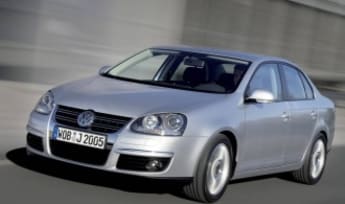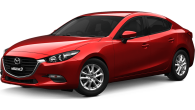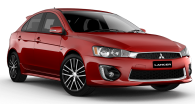That's why the Jetta — a Volkswagen Golf with a boot — is VW's mainstream US market small car. Americans wanting a hatchback VW get fobbed off with the old model Golf, still on sale in the US. In any other country — including here — the Jetta is well and truly medium sized.
The Jetta replaces the Bora in Volkswagen's local line-up. It's based on the Golf 5 as the Bora was based on the Golf 4, which means it's got bigger as the Golf has grown.
At 4.55m from stem to stern it's a significant 18cm longer than the Bora and 15cm shorter than the superseded Passat. Most significantly, it's 35cm longer than the Golf on which it's based. The result is a 527-litre boot, comparable with that of many large cars, as often happens when a hatchback is redesigned as a sedan.

The Jetta's hefty boot symbolises some marketing baggage. It sits a little higher on the prestige car totem pole than the Golf, not offering that model's entry-level petrol and diesel engines and carrying a little more equipment. The most important inclusion is electronic stability control, the system that recognises the beginnings of a skid and takes partial control of the throttle and brakes. Other minor niceties include standard reversing sensors (much appreciated because the boot is invisible from the driver's seat), optional Xenon headlights — for a hefty $1890, they must be an insurer's nightmare — and a neat little inverted T-handle in the boot to hold plastic shopping bags.
The view from the driver's seat is identical to that in a Golf. There's the same agreeable combination of textures, lights and colours giving the impression of expense and quality although there were a couple of rough road buzzes in the test car. For ease of use many of the controls are better than those of Volkswagen's sister marque Audi. But having no radio tuning button as part of the steering wheel audio controls is a puzzling omission, and the old-fashioned indicator stalk mounted cruise control is not the best.
The diesel emits an industrial sound for the first few seconds after start, but once under way is hard to tell from a petrol engine. At freeway speed its muted drone is covered by road noise and a little bit of wind roar.
It drives either a six-speed manual or Volkswagen's Direct Shift Gearbox twin-clutch automatic. The TDI's abundant torque and the DSG's smooth and efficient action are made for each other. It's the only auto-clutch gearbox that really does work as a substitute for the less efficient conventional automatic transmission. The only criticism might be how the first burst of torque can come on a little abruptly from very low revs, although once you get used to that it's a nice way to drive.
On the open road the 2.0-litre TDI showed an unexpected ability to rev every bit as well as a typical petrol engine from not so long ago. Part-throttle and overtaking response was very impressive — by the seat of the pants it feels like a V6-engined petrol car of about 3.0-litres. Only a purist — and a hard-driving one at that — would complain about its speed and throttle response.
Back-roads driving took a toll on fuel economy, which at 7.4 litres per 100km was not as good as VW's advertised 6.2l/100km for the DSG TDI, although there's little doubt the TDI would do at least that well on a constant speed highway run. It still beat the best figure for a petrol engined Jetta of 8.2l/100km and would give a range of 750km.
The Jetta shares its fine handling with the Golf. Roadholding is impressive with a stable feeling at all times although Jetta feels more like a big car rather than a nippy hatchback. ESC, while standard on the Jetta, is unavailable on the Golf — a difference that would instantly put the booted version ahead of the hatch on our shopping list. Briefly switching it off revealed plenty of part-throttle wheelspin on damp surfaces as the front driving wheels struggled with the diesel's 320Nm. But even then torque steer was never intrusive. The electro-mechanical power steering on both cars is one of the better examples of its type, with accuracy and reasonable degree of feel.
Considering the Jetta's role as the main US market Volkswagen its firm, at times almost harsh, ride comes as a surprise. American cars are usually at the other extreme: soft and flabby as a fast food-fed stomach. US road tests mention no concerns with the ride on their version. But Australia's Jetta has a typically European feel with disciplined compliance, but little plushness, over bumps. Its noisiness over coarse or broken road surfaces is also typically European.
Combined with hard seats the result can be less than luxurious. In their favour the seats have more side support than some found in more overtly sporting cars, but they are not an ideal place to spend a day — particularly in the optional leather trim, which seems to emphasise their firmness. They let down a car which in other ways makes an excellent long-distance tourer.
Range, luggage space and a roomy cabin are among its assets. There's plenty of back seat headroom for adults although realistically there's only room for four full-size occupants.
The Mexican-built test car had a couple of minor quality problems. One of the radio tuning buttons stopped working and looseness in the transmission selector meant the key could be hard to remove from the ignition. Minor glitches sure, but they raise the nagging suggestion that more might be in store.
However, two petrol models driven later had no obvious quality flaws. When the Golf 5 arrived here in 2004 every press car we drove had some kind of flaw so with two chances in three of getting a good one, the Jetta seems to be a better gamble, if not quite an acceptable improvement.
But driving those petrol Jettas sowed the seeds of confusion. The 2.0 TDI is an excellent diesel engine but so are the 2.0-litre FSI direct-injection petrol engines. They make the petrol or diesel question a difficult one. Low fuel consumption, excellent touring range and a desire to commune with the authentically European version of the Jetta might tip a buyer towards diesel. However, the FSI models are better for refinement, top-end power and have better than average fuel consumption for petrol engines of their size.
The 147kW turbo FSI engine shared with the Golf GTI makes the Jetta genuinely lively and while the 110kW non-turbo feels almost slow, even by comparison with the diesel, it's both torquey and nicely refined.
But if diesel's your thing the Jetta is the cheapest diesel sedan on the market and by no means nasty. Although we hate to agree with advertising copywriters it does indeed feel more expensive than its headline price. However, selecting from a costly extras menu soon fixes that. If it rode a little more loosely and was screwed together a bit more tightly it would be outstanding rather than merely very impressive.
Volkswagen Jetta 2006: 2.0 Tdi
| Engine Type | Diesel Turbo 4, 2.0L |
|---|---|
| Fuel Type | Diesel |
| Fuel Efficiency | 5.8L/100km (combined) |
| Seating | 5 |
| Price From | $4,290 - $6,270 |
Pricing Guides






















.png)



.jpg)